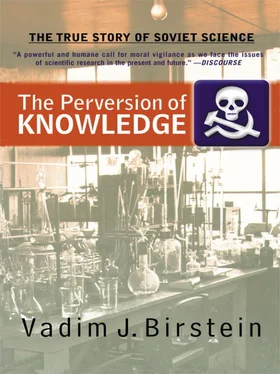Vadim J. Birstein
THE PERVERSION OF KNOWLEDGE

THE TRUE STORY OF SOVIET SCIENCE
There is only one hope… it is absolute openness and the absence of any secrecy in science. Only thus can we hope that the scientists who succeed will be those who do not confuse exceptional human beings with experimental animals.
—B. Müller-Hill,
Murderous Science
Everything can be taken from a man but one thing, the last of the human freedoms—to choose one’s attitude in any given set of circumstances, to choose one’s own way.
—V. Frankl,
Man’s Search for Meaning
Tables
1.1 Main changes in the NKVD/KGB structure, 1917–present
1.2 List of the VCheKa/KGB chairmen, 1917–present
2.1 Changes in subordination of Special Secret Laboratory No. 1, 1939–1978
3.1 Dates of Mairanovsky’s biography
3.2 Events surrounding the Beria and Merkulov trials
Photos
The original VCheKa-KGB building at Lubyanka (Dzerzhinsky) Square, 1926
The main yard of Vladimir Prison, 1998
Lavrentii Beria, 1938
Lavrentii Beria, 1946
Vsevolod Merkulov, 1945
The corner of Bol’shaya Lubyanka Street and Varsonofyevsky Lane, 1997
A corridor inside Vladimir Prison, 1990
Nikolai Blokhin, 1956
Aleksei Speransky with students, 1952
Academician Gleb Frank, 1951
Presidium of the Soviet Academy of Sciences, 1950s
Monument to the victims of Stalin’s terror, 1997
LIST OF ACRONYMS AND ABBREVIATIONS
Dalstroi: Main Directorate for Building in the Far East
EKO: Economical Department
FAPSI: Federal Government Communications and Information Agency
FSB: Federal Security Service
GEU: Main Economic Directorate
Gidroproekt: Directorate for Projecting, Planning, and Research for Hydrotechnical Construction
GKO: State Committee of Defense
Glavgidrostroi: Main Directorate of Camps for Hydrotechnical Construction
Glavlit: Main Directorate on the Literature and Publishing Houses
Glavmikrobioprom: Main Administration of the Microbiological Industry
Glavpromstroi, or GULPS: Main Directorate of Camps for Industrial Construction
Glavsortupr: Main Directorate of Seed Varieties
Goelro: State Energy Committee
Gosizdat: State Publishing Company
GosNIIOKhT: State Scientific Research Institute of Organic Chemistry and Technology
Gosplan: State Planning Committee
GPU: State Political Directorate
GTU: Main Directorate of Transportation
GUGB: Main Directorate of State Security
GUILGMP: Main Directorate of Camps of the Mining Metallurgic Industry
IEB: Institute of Experimental Biology
IEM Gamaleya: Institute of Epidemiology and Microbiology
IMEMO: Institute for World Economy and International Relations
INO: Foreign Department
IVAN: Institute for Oriental Studies
JAC: Jewish Anti-Fascist Committee
KEPS: Commission for the Study of Natural-Productive Forces
KGB: Committee of State Security
KI: Committee on Information
KTPH: Kazan Psychiatric Prison Hospital
KUBU: Commission to Improve Living Conditions of Scientists
MGB: USSR Ministry of State Security
Minmedbioprom: Ministry of the Medical and Microbiological Industries
MOIP: Moscow Society of Naturalists
Narkompros: Commissariat of Education
Narkomzdrav: Commissariat of Health
Narkomzem: Commissariat of Agriculture
NEP: New Economic Policy
NKVD: People’s Commissariat of the Interior
NTO: Scientific Technology Section of the VSNKh
NTS: Popular Labor Alliance of Russian Solidarists
OAU: VCheKa Administrative-Organizational Department
OGPU: United State Political Directorate
OMNI: Society of Moscow Scientific Institute
OO: Special Department
OOT: Department of Operational Equipment
OSO: MGB Special Board
OSS: Office of Strategic Services
OTU: Operational-Technical Directorate
OVD: Department for Investigation of Especially Important Cases
PBO: Petrograd Armed Organization
Politotdel: Political Department
RFYaTs-VNIITF: Russian Federation Nuclear Center
RNP: Russian National Party
ROVS: White Russian Military Union
RSFSR: Russian Federation
SMERSH: Military Counterintelligence
SO: Secret Department
SOD: Council of Men in Public Life
SOE: Special Operation Executive
SOU: Secret-Operational Directorate
Sovinformburo: Soviet Information Agency
Sovmin: Council of Ministers
Sovnarkom: Council of People’s Commissars
StB: Czechoslovak Security Service
SVR: Foreign Intelligence Service
TKP: Labor Peasant Party
TseKUBU: Central Commission to Improve Living Conditions of Scientists
TsNIIST: Central Scientific Investigation Institute for Special Technology
VARNITSO: All-Union Association of Workers of Science and Technique to Assist the Socialist Construction
VASKhNIL: All-Union Academy of Agricultural Sciences, or Agricultural Academy
VCheKa: All-Russian Extraordinary Commission
VIEM: All-Union Institute of Experimental Medicine
VIR: All-Union Institute of Plant Breeding
VNII: Genetika All-Union Research Institute of Genetics and Selection of Microorganisms
VNII-1: All-Union Research Institute One for Gold and Rare Metals
VNIRO: All-Union Scientific Research Institute of Fisheries and Oceanography
VRK: Military-Revolutionary Committee
VSNKh: Supreme Council of National Economy
VTsIK: All-Russian Central Executive Committee
VTsSPS: All-Russian Council of Trade Unions
DRAWING UPON THE many new sources that have appeared since the Soviet Union was dissolved, including materials from the KGB archives, Dr. Birstein offers a detailed and fascinating account of how the so-called poison laboratory was established under the auspices of the Soviet secret police, the NKVD (People’s Commissariat of the Interior). Headed from the 1930s to the 1950s by a biochemist and physician named Grigory Mairanovsky, this laboratory served as the base for inhumane and cruel medical experiments on unsuspecting prisoners who had been condemned to death by the notorious Soviet judicial system. The usual procedure was for those conducting the experiments to lure the victim into complacency by feigning a straightforward medical examination and then, under the guise of a legitimate medication, injecting poison into the victim. The resulting deaths, observed through secret peepholes with detachment by the physicians, were often excruciatingly painful and agonizing.
Those participating in these terrible experiments on humans justified their actions by considering them in the context of a larger war against the enemies of the Soviet people. These poisons were part of their arsenal of weapons in this war, and they were operating on the orders of the highest Soviet authorities. But, as Dr. Birstein demonstrates, the perpetrators of these experiments were in fact sadistic criminals with no regard for human life. Furthermore, the scientists and doctors involved in these biomedical projects sacrificed the integrity of the entire Soviet scientific community by making scientific research a tool of the totalitarian state.
—Dr. Amy Knight Adjunct Research Professor, Institute of European and Russian Studies, Carleton University, Ottawa, Canada
Читать дальше












